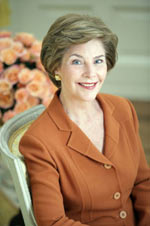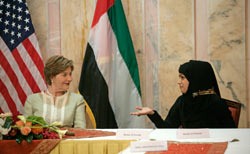 |

Raising Breast Cancer Awareness in the Middle East
 This October, I spent a week in the Middle East to promote breast cancer awareness and early detection. My travels took me to the United Arab Emirates (UAE), Saudi Arabia, Kuwait, and Jordan, where I met with government officials, leaders of medical and educational institutions, and prominent women's-rights activists.
This October, I spent a week in the Middle East to promote breast cancer awareness and early detection. My travels took me to the United Arab Emirates (UAE), Saudi Arabia, Kuwait, and Jordan, where I met with government officials, leaders of medical and educational institutions, and prominent women's-rights activists.
The trip was an opportunity to bring the United States and the countries of the Middle East closer together by addressing the shared challenges facing women. Twenty-five years ago in the United States, breast cancer was a taboo subject. Because women didn't talk about the disease, they didn't benefit from early detection, which is the closest thing we have to a cure. Today, the situation facing women in the Middle East is similar. And through the U.S.-Middle East Partnership for Breast Cancer Awareness and Research, American women and Middle Eastern women are sharing their experiences and expertise to save the lives of women everywhere.
The U.S.-Middle East Partnership joins medical communities in Saudi Arabia, Jordan, and the UAE with the medical expertise of the University of Texas M.D. Anderson Cancer Center. This partnership will benefit from the educational resources of Susan G. Komen for the Cure and the commitment of the U.S. State Department.
 |
Mrs. Laura Bush talks with Basmah Seyoudi during a roundtable discussion with young Arab women leaders in Abu Dhabi.

White House photo by Shealah Craighead
|
Breast cancer is personal for me. Both my grandmother and my mother had breast cancer. Thankfully, they both survived their illnesses, and my mother is alive and healthy today because she detected her cancer early. Like many American women, she benefited from improved screening programs and increased public awareness. Today, 70 percent of breast cancer cases in the United States are diagnosed early, when they are much easier to treat. But in the Middle East, 70 percent of breast cancer cases are not detected until they reach stages 3 or 4.
In the Middle East, breast cancer comes with a heavy cultural stigma. Women are sometimes abandoned by their husbands when the disease is diagnosed. Such stories are discouraging, but on my trip, I was inspired by many more stories of hope. I met one woman whose husband and sons shaved their heads in solidarity with her while she underwent treatment. Other women who have been treated successfully are now involved in outreach and education campaigns to change the social norms in their communities.
In Abu Dhabi I visited the Pink Majlis, a forum for important discussions where breast cancer patients at Sheikh Khalifa Medical City are educated about the disease. And in Dubai, I helped launch the "Making It Our Business: Breast Cancer Awareness" program. Eleven companies, both American and Emirati, signed on as charter members, pledging to educate their employees, families, and customers about breast cancer.
In Riyadh, Saudi Arabia, I visited the Abdul-Latif Cancer Screening Center, which has just installed state-of-the-art facilities. And at the King Hussein Cancer Center in Amman, Jordan, I announced that the U.S.-Middle East Partnership will expand to Morocco, the Palestinian territories, and Egypt next year.
Through this historic partnership, these countries and medical institutions will share discoveries and data that can lead to world-class cancer research. New and better treatment options for breast cancer can come from a researcher in Washington, a biologist in Amman, or a young doctor in Riyadh. Wherever these options are discovered, they will help women in the Middle East, the United States, and countries around the world live long and healthy lives.
|